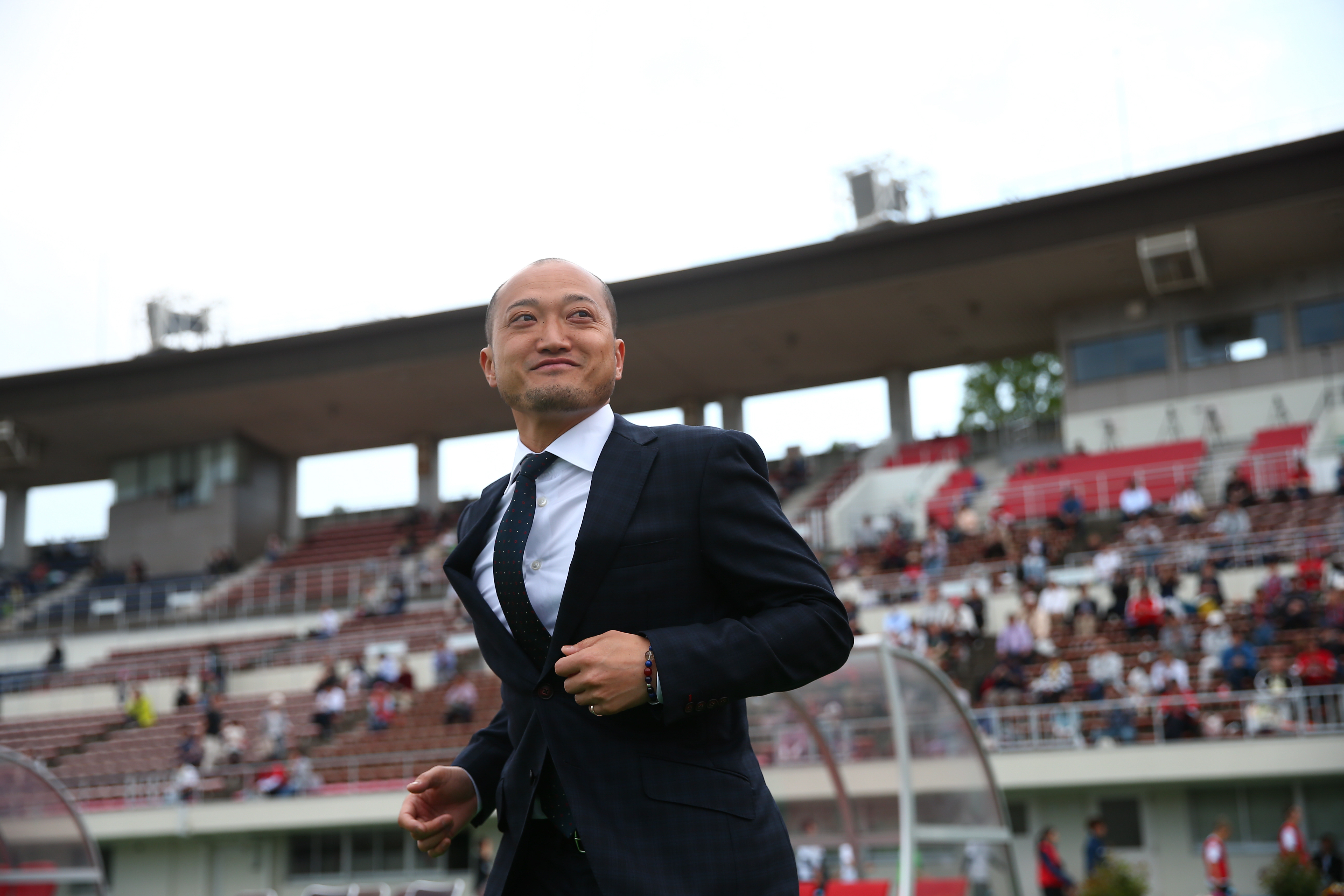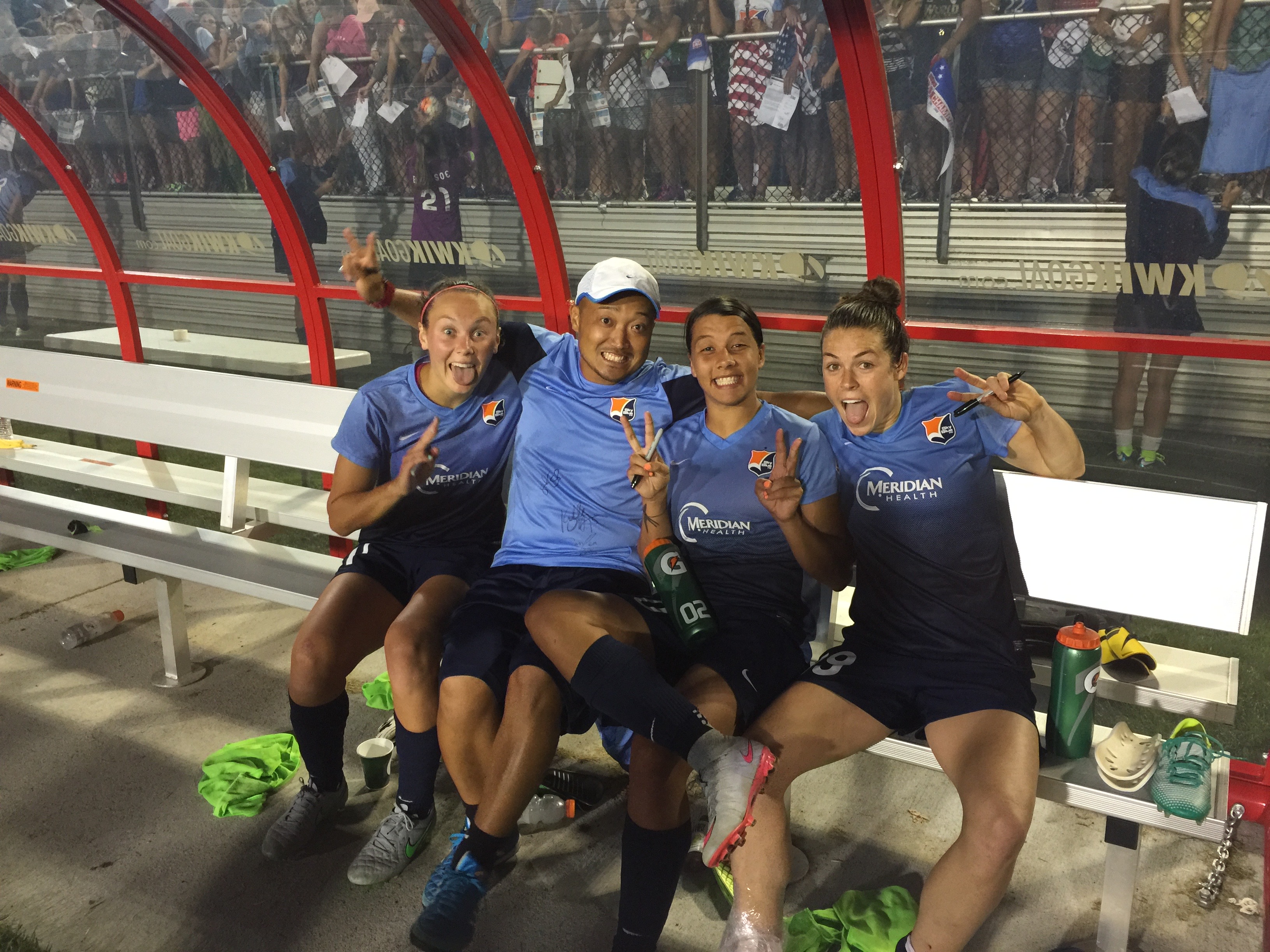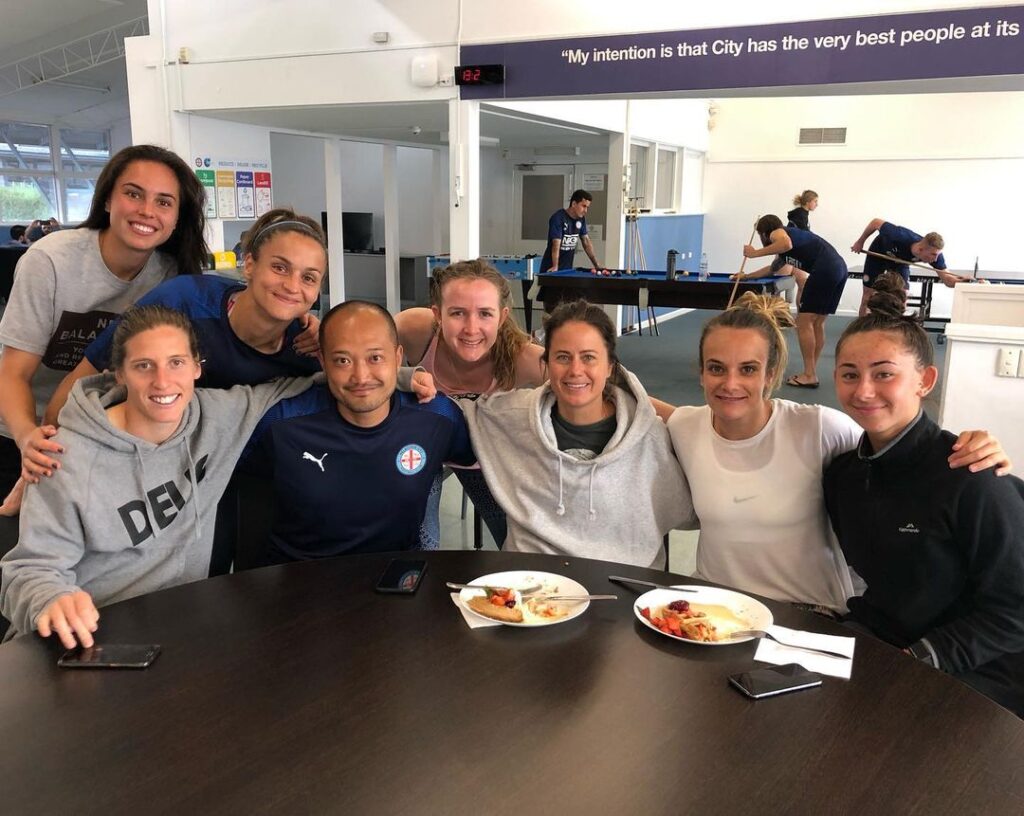
With the FIFA Women’s World Cup just two years away, Nadeshiko Japan must learn the lessons of Tokyo 2020 in order to return to the glory days of 2011, according to a former Nadeshiko League treble-winning manager.
Following a narrow group stage ‘scrape-through’, Nadeshiko Japan were eliminated by silver medalists Sweden in the quarter finals of the Tokyo 2020 women’s football tournament. Given that Nadeshiko’s greatest achievements include their memorable 2011 World Cup win and a silver medal at the 2012 London Olympic Games, this is surely a finish that falls short of expectations.
A post-mortem will be held by the JFA later in August, with the sword of Damocles very much dangling over head coach Asako Takakura. Seemingly a fresh perspective and change of direction is desired by the governing body.
The Asian Game sat down with Nadeshiko League treble-winning manager Takayoshi ‘Taka’ Ishihara for a deep-dive assessment of Japan’s Olympic shortfall and his thoughts on the road ahead.
Taka won all available domestic titles with INAC Kobe Leonessa in 2013 before moving overseas to take coaching positions at Sky Blue FC (now NJ/NY Gotham FC) in the United States and Melbourne City FC of the Australian W-League.
Japanese coaches with experience working overseas are few and far between. An exception to the rule, Taka has coached high profile talents such as Sam Kerr, Caitlin Foord, Kyah Simon and Kelley O’Hara to name but a few. He also holds a JFA S Pro License along with an AFC Diploma-Pro.

(Photo: IG/taka_ishihara)
Taka began by voicing his compassion and sympathy for Takakura and the tough task she was faced with at Tokyo 2020.
“As a coach I sympathize with her and understand the difficult challenge of winning a major tournament,” he said. “I believe she made every decision with the players, fans, country and Olympic gold at heart.”
Reflecting on Japan’s overall performance at Tokyo 2020, Taka was quick to identify the terminal flaws in Takakura’s approach.
“Of course, this result has failed to meet expectations,” he continued. “I think there are two key errors that have continued to hinder the progress of this Japan side since Takakura over five years ago.
“Firstly, it seems the players have been encouraged not to go and play abroad. Nadeshiko’s best game plan is to focus on maintaining possession and keeping the ball moving throughout the game. Naturally this requires a settled squad and team chemistry, so it is understandable that she wanted to keep the team close together.
“However, in the games against world class teams like Canada, Team GB and Sweden, we could clearly see that Japan were unable to cope with the physicality and had no way of playing around it.
“I feel Japan would be better equipped to compete against these opponents if they had more experience of playing against them week in, week out at club level.”
Unlike with the World Cup, clubs are not obliged to release their players for the Olympic Games. Taka was quick to dismiss this as a viable excuse for not letting domestic talent hone their skills overseas.
“That’s true but she has had five years to refine her best squad. Just two or three years overseas experience would go a long way in evening out the playing field at these Olympics. There would still have been sufficient time to settle the squad back here in Japan.
“Let’s not forget that many of these players have also come through academies together and already have a grounded understanding of each other’s playing style. She could have achieved the best of both worlds in my opinion”.
“The second error is on a tactical level. For sure Takakura played to Japan’s strengths. They passed the ball well and were tenacious going forward. But it seemed like it was possession for possessions sake with very few clear-cut chances created.
“I don’t think Takakura has many goal scoring ideas like we saw with other major teams in the tournament. There was only a Plan A and that Plan A was not strong enough.
“An alternative could have been to adopt a more withdrawn, defensive system designed to lure opponents forward and pounce when their back line is fragmented. Mana Iwabuchi’s goal against Canada was scored in this manner.”
Takakura’s five-year tenure has not entirely been in vain, however, as Taka acknowledges the fruits of her labor.
“Things did not work out as planned here, but the future is bright for Nadeshiko Japan,” he said. “I truly believe we have some of the best technical talent in the world and we definitely saw that at Tokyo 2020.
“Of course we expected Iwabuchi and Saki Kumagai to take centre stage, but I was particularly impressed by the fancy footwork of Hina Sugita and a promising display from 18-year-old Momoka Kinoshita. The latter should go and play overseas tomorrow!” Taka exclaimed with clear optimism for the current talent pipeline.

Drawing on his experience of coaching players of various levels both in Japan and overseas, Taka speculates as to how Takakura decided on her strategy.
“At U15, U16, U18 and U19 level Japan’s women’s team regularly win international titles and are considered major players,” he explained.
“A large part of this is due to the large amount of time the players spend together at youth level and the synergy that develops as a result. Other national teams do not have the same level of togetherness at this age and therefore do not achieve the same levels of team harmony Japan does.
“Later on, however, these teams will play together more and more and inevitably harness that all important team spirit. I think Takakura misjudged the situation by only looking at Japan’s record at youth level and thinking that this success can be transferred to senior level simply by keeping the same squad together throughout the key development stages.
“The reality is that other national teams discover their game plan in later stages of the development cycle and their true potential is realized then.”
The WE League’s contribution to international success
Japan’s first professional women’s league is scheduled to launch on September 12. Players will now be signed on full-time contracts with appropriate salaries provided. This will enable them to commit fully to the training and development programs set out by their respective teams, enhancing the quality of the league as a whole.
The WE League brings with it a further opportunity to be explored.
“With the WE League we now have the perfect opportunity to entice some of the world’s finest talent,” Take explained.
“This could be another way to give Japanese players experience competing against foreign players. It would also go a long way in promoting the league to the global audience.
“During my time coaching overseas players often discussed the possibility of playing in Japan with me. It seems they admire our possession-based playing style and have an interest in Japanese culture in general. This is an opportunity I hope the WE League will take advantage of.
“However, this is easier said than done. In the past local managers have often struggled to assimilate foreign players into Nadeshiko League squads. When Caitlin Foord, for example, was playing for Mynavi Sendai Ladies she received very little playing time. The manager at the time cited her reliance on speed alone as the reason for not selecting her.
“Now she is playing number nine for Arsenal and lighting up international tournaments with the Matildas. Clearly there has been an oversight here and her talent could have been put to better use during her time in Japan.
“The big three, NTV Beleza Tokyo Verdy, Urawa Reds Ladies and INAC, are also reluctant to sign foreign players these days. Given that they achieve success with homegrown players only, I suppose they feel little need to look outside. But there is much to be said for the benefits an international player can bring to a team.
“It can motivate the other players to work harder and produce better results, whilst generating interest from overseas from a promotional standpoint. I am hoping the JFA will take this view and support WE League clubs in acquiring foreign talent.”
JEF United Chiba Ladies recently signed Australian international Alex Chidiac and Philippines international Quinley Quezada while Sarina Bolden, also from the Philippines, will join Chifure AS Eifen.
The smaller clubs seem to be taking a proactive approach in importing foreigner talent ahead of the WE League’s September launch. However, it is yet to be seen whether or not the bigger teams will follow suit.
“As I see it, the potential for future success on the international stage depends on the ambition of the JFA and its willingness to embrace foreign influence,” Taka opined. “Supporting homegrown players in gaining overseas experience and encouraging local clubs to add foreign talent to their rosters are the two areas that will help close the gap between Japan and the world.”
The Asian Game thanks Taka for taking the time to share his thoughts and experiences with us. We will surely be calling in again in the not too distant future for his input on all things women’s football.




